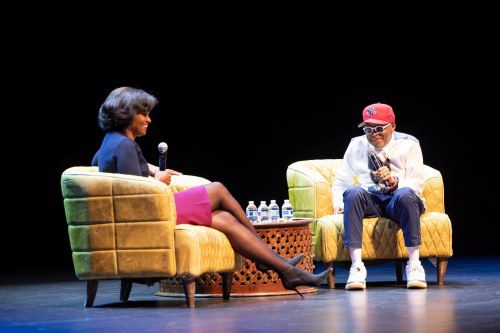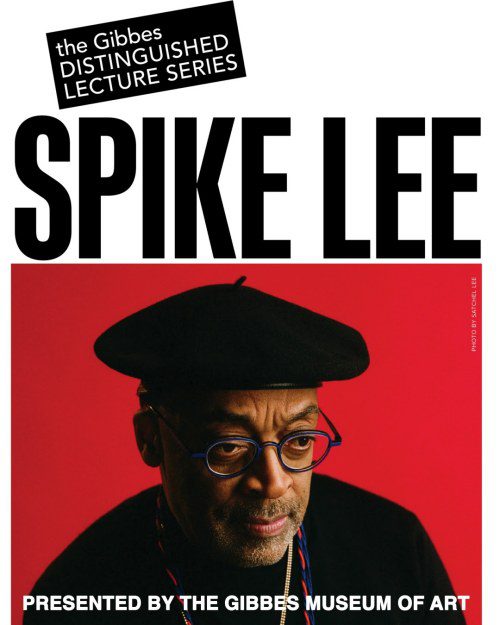
The Gibbes Museum of Art, a beacon in the American South since its establishment in 1858, honored Spike Lee
at the Museum’s 2024 Distinguished Lecture Series annual event. The conversation at the Charleston Music Hall was filled to capacity, moderated by Pauline Forlenza, Director and CEO of the American Federation of Arts and co-presented with Angela Mack, President and CEO of the Gibbes Museum of Art. The conversation revealed new insights into the art world’s continued recognition of Spike Lee’s cultural impact. Lee’s legacy as a visionary icon worldwide is anchored by his longstanding commitment to authenticity and social justice. The Museum provided free live-streaming of the event for students from across the country, and is now making the video accessible to all viewers at this link, due to the timeliness of the discussion.
During his talk, Spike Lee championed the vital role of Black artists in the American South, especially during this crucial time for our culture. Lee highlighted artworks from his collection by African American southern artists that influenced his work, including: William H. Johnson (born in South Carolina); Romare Bearden (born in North Carolina); Deborah Roberts (Texas); Radcliffe Bailey (Georgia); and Michael Ray Charles (Louisiana). Lee discussed how these artists have always been creative sources of artistic expression for his film work, and for his ongoing creativity in arts and entertainment.
“Academy Award-winning filmmaker, writer, producer, educator and art collector Spike Lee is a major influence on visual culture,” says Angela Mack, the Museum’s President and CEO. “His work spans four decades of artistic impact that has inspired generations. The Gibbes Museum of Art is thrilled to welcome Spike Lee to Charleston as our 2024 honoree.” The Museum’s series brings world-renowned artists, art collectors, museum leaders, philanthropists, and art historians to Charleston to stimulate public discussion about creativity and the visual arts. Previous honorees include: Jeff Koons, Fred Wilson, Maya Lin, Christo, Steve Locke, Dr. Sarah Elizabeth Lewis, Leonard A. Lauder, Jerry Saltz, Philippe de Montebello,
and Martin Z. Margulies, among others.
During the conversation, Lee and Forlenza pointed out how many of the characters and themes from Lee’s films of the 1980s and 1990s foretold issues we are currently living through today, including: gentrification, global warming, and racial tensions. “History is repeating itself now,” says Spike Lee in the video of the lecture. “Looking back at these beloved characters, and the struggles they faced in these films, we can see how they forecasted back then (40 and 30 years ago), what’s happening now. The stuff you run away from follows you,” adds Lee.
During Lee’s presentation for the Gibbes Museum of Art Distinguished Lecture Series event at the Charleston Music Hall, Lee also spoke about the dangers of AI on arts and culture, social media, news, and the entertainment industry. “I think that sometimes technology can go too far,” said Lee. “I’m scared of what people can use AI to do and pass off as the real thing. Some of the things AI portrays people as saying is the opposite of what those people are all about. Especially with the Writers Guild trying to get the studios and networks to agree not to have these computers writing scripts,” adds Lee. “It’s scary, you don’t know what’s what.” When asked about his advice for young artists and filmmakers, including how art addresses current social issues, Lee said: “I tell my students they have to be committed and put the work in. Artists have to choose their own path. Artists have to do what their hearts and souls tell them to do.”

The Museum invited Pauline Forlenza, Director and CEO of the American Federation of Arts (AFA), to Charleston as guest moderator. “Spike Lee is an American treasure. His work brings to light bold storytelling and profound social commentary.” says Pauline Forlenza.
The AFA is a New York-based nonprofit that originated in 1906, with a mission to bring traveling exhibitions to communities that may not necessarily have access to art. For 118 years, the AFA has created initiatives to bring more diverse audiences into museums across the country and worldwide. “The Gibbes Museum’s rich history of spearheading art in America, as one of the country’s most longstanding cultural institutions, aligns with the mission of the American Federation of Arts,” adds Forlenza. “The Gibbes Museum has played a major role in expanding the community’s aesthetic and cultural lives, impacting the careers of American artists for more than a century.”



















